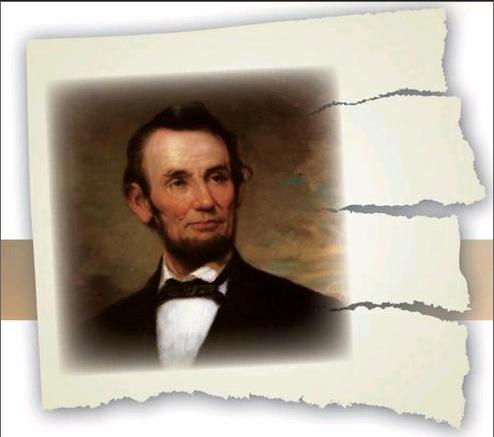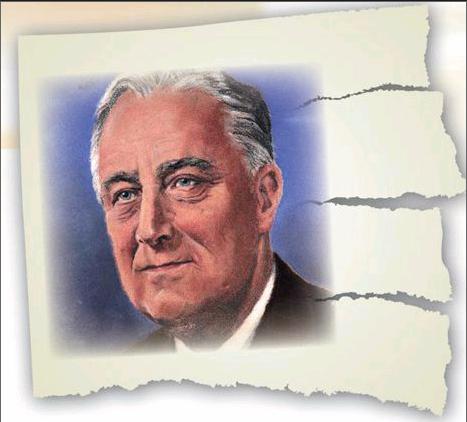名人年少也恶搞
2014-04-01文/ByJulieWinterbottom译/子昊
文/By+Julie+Winterbottom+译/子昊



Does pulling pranks in childhood lead to success later in life? Judging from the youthful pranks of these four famous people, the answer might be yes.
是不是小时候爱捉弄人长大了就有出息?如果从以下四位名人小时候的恶作剧来看,答案也许是肯定的。
Abraham Lincoln 亚伯拉罕·林肯
When Abraham Lincoln was a young man living at home, he was quite the prankster2). His stepmother Sarah Bush Lincoln used to tease him about his height, telling him that he'd better keep his head clean or she'd have to scrub3) the ceiling. The story goes that one day when Sarah was out, Abe noticed two boys playing barefoot outside next to a mud puddle. He asked them to stomp4) in the mud until their feet were covered. Then he brought them back to the house. One by one, he carried them inside and held them upside down so their muddy feet could touch the ceiling. Then he had them "walk" across the ceiling, creating a trail of brown footprints. Sarah reportedly took the prank with good humor—but she did make Lincoln repaint the ceiling.
亚伯拉罕·林肯小时候在家里可是十分爱捉弄人的。他的继母萨拉·布什·林肯常常拿他的身高开玩笑,说他最好保持头发干净,否则她就得擦洗家里的天花板了。据说有一天萨拉外出时,阿贝(编注:亚伯拉罕的简称)看见两个小男孩光着脚在外面的泥塘旁边玩耍。他叫他们在泥里使劲跺脚,让脚上沾满泥,然后把他们带回了家。他把他们逐个抱进屋,头朝下举起来,好让他们的泥脚丫能碰着天花板。接着,他举着他们在天花板上“走”了一圈,留下一串棕色的脚印。据说萨拉对这个恶作剧表现得很大度,不过她还是让林肯把天花板重新粉刷了一遍。
Franklin D. Roosevelt 富兰克林·D·罗斯福
Franklin D. Roosevelt is another president who got an early start pulling pranks. Young Franklin was looked after by a doting5) mother and a series of nurses, governesses6), and tutors. When he was ten, a German-speaking nurse accompanied the family on their annual tour of Europe and became the inevitable victim of a prank. Franklin snuck into her room during the day and poured a few spoonfuls of effervescent7) powder in the chamber pot8) under her bed. That night, when the nurse relieved herself9), the contents of the pot began to hiss and roil. Thinking she was ill, the nurse ran to Mrs. Roosevelt's room for help. Roosevelt later said that the two women never figured out it was a prank—but his father did. The senior Roosevelt summoned his son to the smoking room to be reprimanded10), but he couldn't keep a straight face11). Breaking into laughter, he told his son, "Consider yourself spanked12)."
富兰克林·D·罗斯福也是位从小就爱搞恶作剧的总统。罗斯福小的时候,照顾他的除了十分宠爱他的母亲,还有一群女护工、保姆和家庭教师。罗斯福十岁时,一个说德语的女护工跟随罗斯福一家踏上了一年一度的欧洲之旅,从而不可避免地成了他捉弄的对象。有一天,罗斯福在白天偷偷溜进那个女护工的房间,往她床下的便盆里倒了几勺泡腾散。当天夜里,女护工起床方便后,便盆里的东西就开始嘶嘶冒泡。女护工以为自己生病了,赶忙跑到罗斯福夫人的房间求助。罗斯福后来说,那两位女士一直都没发现那是个恶作剧——不过他的父亲看出来了。老罗斯福把儿子叫到吸烟室,准备训斥一顿,但又无法板起脸。他忍不住笑着对儿子说:“就当我已经教训过你了。”endprint
Willie Morris 威利·莫里斯
Mississippi native Willie Morris was the editor of Harper's Magazine13) during the 1960s and later wrote a series of bestselling memoirs. He had deep affection for pets and practical jokes, and he managed to combine the two in an ingenious14) prank he pulled when he was 13.
In the 1940s, it was common for kids in Morris's hometown of Yazoo City to start driving the family car at 13. When Morris took his parents' DeSoto for a spin, he would always bring his dog Skip along for the ride. One day, when they got to the edge of town, Morris got Skip to prop himself against the steering wheel so Skip was peering through the windshield. Then Morris slowed down and crouched out of sight under the dashboard15). He guided the steering wheel with his right hand while Skip kept it steady with his paws. As they passed a café, a man shouted, "A dog! A dog driving!" and rapidly fell off his chair. One Sunday, Morris got an even better reaction. As he approached a rural church, he noticed that a revival16) meeting was letting out. He pulled over, put Skip behind the wheel, and continued up the road. As they neared the church, a woman exclaimed, "Is that a dog driving that car?" Suddenly the lively crowd of parishioners17) went dead silent. It was a hush18) Morris never forgot. "It was as if the very spectacle of Old Skip driving that green DeSoto were inscrutable19)," he later wrote.
密西西比州的威利·莫里斯在20世纪60年代曾是《哈泼斯杂志》的编辑,后来又创作了一系列畅销的回忆录(编注:如《我的小狗斯基普》)。他非常喜欢宠物,也喜欢搞恶作剧。13岁时,他将这二者结合起来,上演了一出绝妙的恶作剧。
20世纪40年代,在莫里斯的家乡亚祖城,孩子们13岁就开始开家里的车是一件很平常的事。每当莫里斯开着父母的德索托牌汽车出去兜风时,他总是会带上自己的爱犬斯基普。一天,当莫里斯开车来到镇子边上时,他把斯基普架在方向盘上,如此一来,斯基普便一直透过挡风玻璃朝外面看。然后莫里斯减速慢行,把身子蜷缩在仪表板下面不让人看见。他用右手操纵方向盘,而斯基普则用爪子把方向盘扶稳。当他们经过一家咖啡馆时,一个人大叫道:“一只狗!一只狗在开车!”然后猛地从椅子上摔了下来。一个星期天,莫里斯的这种恶作剧引起了更大的反响。他开车经过郊区的一座教堂时,恰逢参加奋兴布道会的人们散场出来。他将车停在路边,让斯基普扶着方向盘,然后继续向前开。当车驶近教堂时,一个妇人喊道:“那是只狗在开车吗?”原本有说有笑的教区居民霎时间变得一片死寂。那种寂静让莫里斯永生难忘。他后来写道:“仿佛老伙计斯基普驾驶那辆绿色德索托汽车的奇观神秘莫测得不得了。”
Steve Wozniak
史蒂夫·沃兹尼亚克
Apple's other cofounder, Steve Wozniak, gravitated20) towards high-tech pranks. During his first year in college, he built a pocket-sized circuit that could jam TV signals. He would take it to a dorm room where a group of people were watching TV and secretly activate the device. The TV screen would go fuzzy21), and Wozniak would wait for someone to get up and hold the rabbit-ear antenna22) at a certain angle in an effort to improve reception. Once the person was in a sufficiently awkward position, perhaps with his or her hand in front of the screen, Wozniak would deactivate the device and the picture would clear up. As soon as the person sat back down, Wozniak would jam the signal again. He would continue until everyone in the room insisted that the person stand holding the antenna for the rest of the show.endprint
苹果公司的另一位共同创始人史蒂夫·沃兹尼亚克更倾向于利用高科技搞恶作剧。大一时,他制作了一个可以干扰电视信号的袖珍电路。他会带着它来到某间开着电视的宿舍,趁大家都在看电视的时候偷偷启动这个装置。这样,电视屏幕就会变得模糊不清。沃兹尼亚克会等着某个人起身去把电视机上的兔耳天线摆到某个角度来让电视信号好些。一旦那个人的姿势足够别扭——也许正在把手伸到电视屏幕前边——沃兹尼亚克就会关闭干扰器,电视画面随即恢复清晰。可只要那个人一坐回去,沃兹尼亚克又会再次打开干扰器。他会这样反复几次,直到全屋的人一致要求那个人在节目结束前一直站在那里用手扶着天线,他才会罢手。
1 prank [pr??k] n. 胡闹,恶作剧
2 prankster [?pr??kst?(r)] n. 恶作剧者
3 scrub [skr?b] vt. 用力擦洗;擦掉
4 stomp [st?mp] vi. 跺脚;重踩
5. doting [?d??t??] adj. 溺爱的,偏爱的
6. governess [?ɡ?v?n?s] n. (尤指旧时的)家庭女教师;保姆
7. effervescent [?ef??vesnt] adj. 【化】泡腾的
8. chamber pot: 便盆;夜壶
9. relieve oneself: 排泄,方便
10. reprimand [?repr?mɑ?nd] vt. 训斥,斥责
11. keep a straight face: 板着面孔
12. spank [sp??k] vt. 严厉斥责
13. Harper's Magazine: 《哈泼斯杂志》,是一本带有美国进步人士及左派立场的月刊,涵盖了文学、政治、文化、艺术等诸多方面。
14. ingenious [?n?d?i?ni?s] adj. (方法等)巧妙的
15. dashboard [?d??b??d] n. (汽车等上的)仪表板
16. revival [r??va?vl] n. 【宗】奋兴会,奋兴布道会。奋兴会是基督教会举办的一系列活动,旨在使信徒的信仰得到奋兴或是让人们获得新的宗教信仰。
17. parishioner [p??r???n?(r)] n. 堂区居民(尤指经常参加本区教堂礼拜者)
18. hush [h??] n. 寂静;安静
19. inscrutable
[?n?skru?t?bl] adj. 神秘莫测的,不可思议的
20. gravitate [?ɡr?v?te?t] vi. 受吸引;移向(toward)
21. fuzzy [?f?zi] adj. 模糊的,不清楚的
22. antenna [?n?ten?] n. <美>天线endprint
